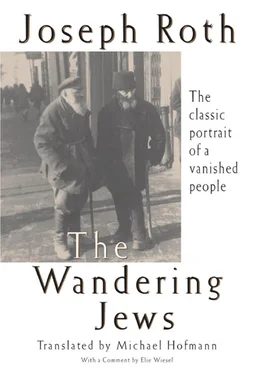And so, conversely, the Eastern Jew sees none of the advantages of his own homeland. He sees nothing of the boundless horizon, nothing of the quality of the people, in whom simplicity can produce holy men and murderers, melodies of melancholy, grandeur, and obsessive passion. He fails to see the goodness of the Slav people, whose coarseness remains more decent than the housetrained animality of the Western European, his secretive perversions, his cringing before the law, with his wellbred hat in his apprehensive hand.
The Eastern Jew fails to see the beauty of the East. He has not been allowed to live in villages or in big cities. Here Jews live in dirty streets and collapsing houses. Their Christian neighbor threatens them. The local squire beats them. The official has them locked up. The army officer fires his gun at them with impunity. The dog barks at them, because their garb seems to provoke animals and primitive people alike. They are brought up in dark heders . The painful perspectivelessness of the Jewish prayer is something they are made acquainted with in early childhood; the passionate wrangling with a God who is more a vengeful God than a loving God, who condemns pleasure as much as sin; the strict compulsion to study and pursue abstractions with young eyes that have never really seen.
For the most part, Eastern Jews experience the countryside only as beggars or vagrants. The majority don’t understand the soil that feeds them. The Eastern Jew feels apprehensive in unfamiliar villages and forests. He is a case apart, partly from choice, partly by force. He has obligations and no rights, except on paper, where they count for nothing. Newspapers, books, and optimistic emigrants all tell him what a paradise the West is. In Western Europe there is legal protection from pogroms. In Western Europe Jews may become government ministers or even viceroys. Many Eastern European dwellings have pictures of Moses Montefiore, who dined regularly at the table of the king of England. The great wealth of the Rothschilds is exaggerated to fairy-tale proportions in the East. From time to time an emigrant will send word home, pointing out all the advantages of the new life abroad. Most Jewish emigrants are too proud to write when things are going badly for them, and most are eager to play up the new home at the expense of the old. They have the naive desire of the small-town boy to cut a dash in front of his erstwhile fellows. In a small town in the East, a letter from an émigré creates a huge stir. All the young people in the place — and not a few of the old — are overcome by itchy feet. They want to leave the country where a war might break out from one year to the next, and from one week to the next, a pogrom. And so they leave, on foot, by train, on board ship, for Western countries where a different, somewhat reformed though no less dismal, ghetto offers its own brand of darkness to the newcomers who have barely managed to escape the clutches of the concentration camp.
When I referred just now to Jews who are completely alienated from the earth that nourishes them, I was referring to the majority of Jews: those who live by the old laws and customs of their Jewish faith. Of course there are also Jews who fear neither the dog nor his master, neither the policeman nor the army officer, who don’t live in a ghetto, who have adopted the culture and the language of their host-nation. They are similar to Western Jews, but are actually more likely than Western Jews to enjoy social equality; and yet they are still kept from freely developing their talents unless they convert from Judaism, and even then things are far from easy. Because each fortunate assimilant will inevitably keep a thoroughly Jewish set of relatives, and it would be a rare judge or attorney or general practitioner of Jewish extraction who didn’t have, say, a cousin, uncle, or grandfather whose mere physical appearance might not put an end to a promising career or at least do him social damage.
It is hard to avoid such a fate. And so, instead of running away from it, many decide to do the opposite. They throw themselves into fate’s arms, not only by not denying their Jewishness but by emphasizing it at every turn and proclaiming their allegiance to a “Jewish nation” whose existence has for several decades now been indisputable, and whose “right to exist” is similarly unarguable. The will of several million people is already enough to form a “nation,” even if it has not existed before.
The idea of a Jewish nationalism is very much alive in the East. Even people who themselves have little truck with the language, culture, and religion of their forefathers claim membership of the “Jewish nation” on the basis of their will and their race. They constitute a “national minority” in a foreign country, striving for their rights as citizens and nationals. Some look toward a future in Palestine, and some, rightly believing that the earth belongs to everyone who treats it with respect, have no national aspirations. (But in either case they are unable to extinguish the primitive hatred that burns so corrosively in their host-people for what seem to them a dangerous number of foreigners.) These Jews no longer live in the ghetto either, nor even in their warm and true traditions. They are deracinated as their assimilated brothers are, sometimes to the point of heroism, because they are the willing victims of an idea — even if it’s nothing better than the idea of a nation.
Both the nationalists and the assimilated Jews tend to remain in the East. The former because they want to fight for rights where they are, the latter because they imagine they are already in possession of such rights, or because they love the country as much as the Christian population does. The ones who emigrate are those who have wearied of the petty but unremitting struggle, and who either know or feel or merely guess that a different set of problems presents itself in the West; that the national squabbles there are just a hollow echo of yesterday’s; that the West has a vision of Europe, which, maybe one day, not before time and not without suffering, will ripen into a vision of the world. These Jews prefer to live in countries where questions of race and nationality may still excite the interest of large and even powerful sections of the population, but these sections are already a little behind the times. There is a faint but unignorable whiff of mold, blood, and low intelligence about them, and for all their efforts, a few, more progressive minds are already grappling with the problems of tomorrow. (These emigrants, be it noted, come from the Russian borderlands, not from Russia itself.) Others may emigrate because they have lost — or have never been able to find — work and a means of support. They are seekers after bread, proletarians, albeit not always with a proletarian consciousness. Others have fled the War and the Revolution. They are “refugees,” generally middle class or lower middle, implacable enemies of the Revolution, and more deeply conservative than any landowning aristocrat could ever be.
Many are wanderers by instinct, not really knowing why. They follow a vague call from elsewhere or a specific one from some relocated relative, the desire to see something of the world and escape the supposed constraints of home, the will to work and make something of themselves.
Many return. Many more remain by the wayside. Eastern Jews have no home anywhere, but their graves may be found in every cemetery. Many grow rich. Many achieve fame. Many make outstanding contributions to foreign cultures. Many lose both themselves and the world. Many remain in the ghetto, and it is only their children who will leave it. Most give the West at least as much as it takes from them. Some give it more than it gives them. The right to live in the West belongs to anyone who sacrifices himself by going to look for it.
Читать дальше












